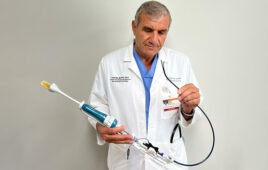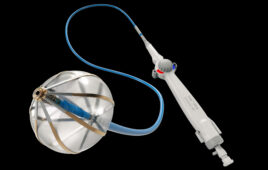
The Promus Elite drug-eluting coronary stent (Image courtesy of Boston Scientific)
This article has been updated with stock market results and comments from Medtronic.
A major new study has concluded that the use of stents in stable heart disease patients is no better than drugs to treat clogged arteries.
Results of the Ischemia study were released at the American Heart Association annual meeting in Philadelphia on Saturday. The $100 million study found that stents were helpful in preventing chest pain during exercise, but no more effective than cholesterol-lowering drugs such as statins in treating patients with moderate ischemia.
Among patients with stable ischemic heart disease and moderate to severe ischemia, routine invasive therapy (stents) failed to reduce major adverse cardiac events compared with optimal medical therapy, the study found. Stents also provided no benefit in preventing all-cause mortality or death from heart attack, but patients who suffered angina reported fewer symptoms. One-third of subjects reported no angina symptoms at baseline. Improvement in symptoms was observed among those with daily/weekly/monthly angina, but not in those without angina.
Although the trial’s overall results may hurt stent manufacturers, its findings revealed evidence for both harm and benefit in routine stenting. Investigators concluded that cardiologists should carefully consider invasive therapy for stable ischemic heart disease patients depending upon the severity of their angina and background medical therapy, and also that stenting can produce optimal coronary revascularization with low procedural complications.
Routine stenting was associated with harm at six months (increase in heart attack just before, during or just after the procedure) and associated with benefit at four years (reduction in spontaneous heart attack). These results do not apply to patients with current/recent acute coronary syndrome, highly symptomatic patients, left main stenosis, or left ventricular ejection fraction, according to the heart association.
Coronary stent manufacturers include some of the biggest publicly traded medtech companies in the world — Medtronic (NYSE:MDT), Cardinal Health (NYSE:CAH), Abbott (NYSE:ABT), Boston Scientific (NYSE:BSX), Becton Dickinson (NYSE:BDX), Terumo (OTC:TRUMY;TYO:4543), and MicroPort Scientific (OTC:MCRPF) — as well as privately held B. Braun, Cook Medical and Biotronik.
BSX shares fell 2.16% between the market opening and 10:30 a.m. Eastern time this morning to $42.42, where it remained at 1 p.m. Shares in ABT were down -$0.74 or 0.867% in early afternoon trading. Medtronic shares remained stable.
“Boston Scientific welcomes additional clinical research generated to improve the treatment of patients with coronary artery disease and is encouraged that the study confirms an improved quality of life in patients with stable coronary syndromes who received ischemic guided revascularization (PCI/CABG),” the company said in a statement to Medical Design & Outsourcing. “These findings build upon more than four decades of clinical evidence that has demonstrated that percutaneous coronary intervention (PCI) is appropriate and can be life-changing for many patients.”
In Boston Scientific’s recent third-quarter analyst call, CEO Michael Mahoney said the study’s results, which were not available at the time of the call, might have a positive impact or produce a loss of up to $40 million, according to the transcript by Seeking Alpha.
Ian Meredith, EVP and global chief medical officer, noted that the “vast majority” of patients — about 80% — who undergo PCI in the U.S. and elsewhere have unstable angina or acute coronary syndromes. Not all patients with stable ischemic heart disease were eligible to be enrolled in the study, which imposed “28 major exclusions” of conditions in patients who had stable angina, the transcript said. Based on these factors, Boston Scientific expects that the impact would not be severe, Meredith said.
Dr. Laura Mauri, VP of global clinical research and analytics at Medtronic, said in a statement that the Ischemia study “reaffirms the fact that patients who suffer from persisting symptoms or encounter challenges with medication may be better suited for intervention. Treatment decisions for stable angina are best made by patients and their physicians on an individual and collaborative basis. We look forward to a more thorough review of the data.”
Other stent manufacturers did not immediately respond to requests for comment.
Separately, the Society for Cardiovascular Angiography & Interventions (SCAI) pointed to the safety of cf coronary stenting in low-risk patients.
“The results of the Ischemia trial are consistent with earlier studies showing medical therapies are essential to keep people safe and help improve quality-of-life, with or without early intervention,” the interventional cardiologists’ group said in a statement on its website. “While the results indicate that a routine strategy of early intervention may not be necessary to prevent adverse events in stable, low-symptom-burden patients, early intervention is safe for patients who prefer to minimize the burden of medical therapies, those who have limited tolerance to medications, or who have persistent symptoms despite medications.”
The findings are not surprising, as earlier studies reached similar conclusions, SCAI added. But the finding that revascularization resulted in lower rates of spontaneous heart attacks was gratifying to the organization.
“We were previously unsure about whether PCI could offer this benefit before Ischemia,” it said. “This study helps interventional cardiologists provide more accurate information to patients about how PCI might help them.”
SCAI also noted that the study did not take into account patients whose symptoms are worsening or those who have had heart attacks. “For those high-risk patients, early intervention plus medical therapy remains the recommended course of action compared to medical therapy alone to keep patients safe,” the group said. “The Ischemia trial findings only underscore the importance of shared medical decision making between physicians and patients. SCAI encourages the development of individualized treatment plans to assure the best patient-centered care possible.”
In the Ischemia study, patients with stable ischemic heart disease and moderate to severe ischemia were randomized to routine invasive therapy (n = 2,588) versus medical therapy (n = 2,591), according to the heart association. In the routine invasive therapy group, subjects underwent coronary angiography and percutaneous coronary intervention (PCI) or coronary artery bypass grafting (CABG) as appropriate. In the medical therapy groups, subjects underwent coronary angiography only for failure of medical therapy.
The primary outcome of cardiovascular death, myocardial infarction, resuscitated cardiac arrest or hospitalization for unstable angina or heart failure at 3.3 years occurred in 13.3% of the routine invasive group compared with 15.5% of the medical therapy group (p = 0.34). The findings were the same in multiple subgroups.
Invasive therapy was associated with harm (~2% absolute increase) within the first six months and benefit within four years (~2% absolute decrease).
The trial’s secondary outcomes included:
- Cardiovascular death or myocardial infarction: 11.7% of the routine invasive group compared with 13.9% of the medical therapy group (p = 0.21)
- All-cause death: 6.4% of the routine invasive group compared with 6.5% of the medical therapy group (p = 0.67)
- Periprocedural myocardial infarction: (invasive/conservative hazard ratio [HR] 2.98, 95% confidence interval [CI] 1.87-4.74)
- Spontaneous myocardial infarction: (invasive/conservative HR 0.67, 95% CI 0.53-0.83)
The study was sponsored by the National Heart and Lung Institute. The mean patient age was 64 years, with 23% female and 41% diabetic.




